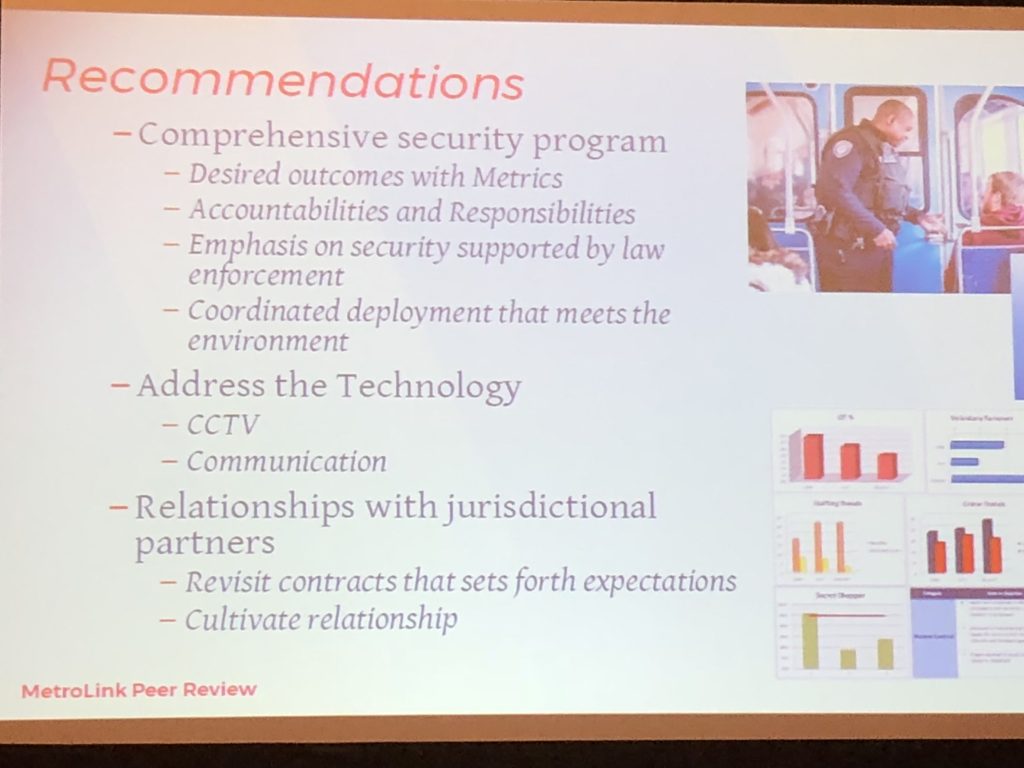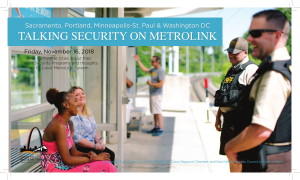Sacramento, Portland, Minneapolis-St. Paul and Washington DC talked Security on MetroLink
Presence, presence, and customer service topped list of recommendations from transit experts to build confidence back in St. Louis Transit system. More than 100 CMT members, transit riders, stakeholders, law enforcement representatives, and community organizations filled the St. Louis Regional Chamber Collaboration Center to talk about MetroLink Security. Sponsored by Citizens for Modern Transit, St. Louis Regional Chamber, and East-West Gateway Council of Governments, a panel of experts from other cities discussed their Transit Security Programs and their thoughts on security on the St. Louis MetroLink System at the latest CMT Talking Transit installation. Key takeaways were presence on the trains and on the system is key to building confidence back. That presence can be in the form of law enforcement, contract security or in- house transit security. They just need to be visible, in uniform and providing good customer service to all riders.
“Great discussion this morning on ways to build confidence back in the St. Louis transit system. The panel of experts indicated that the St. Louis system has more resources than most of their respective systems for security including personnel, but improving presence on the actual system including the trains was key to building rider confidence back. If riders don’t see security – any level of security- they are not going to be as at ease as when they are riding regularly with people assigned to ensuring the security of the system,” said Kim Cella, CMT executive director.
Lurae Stuart, WSP’s Project Manager for the security study, served as moderator for four peer systems including TriMet (Portland, OR), SacRT (Sacramento, CA), Metro Transit (Minneapolis-St. Paul, MN), and WMATA (Washington, D.C.). The study team was charged with looking at ways to manage vulnerability on the system. It was a risk based assessment that looked at three areas: security staff assessment, fare system analysis, and infrastructure of existing system. Recommendations include:
- Comprehensive Security Program
- desired outcomes with metrics,
- accountability and responsibility,
- emphasis on security supported by law enforcement,
- coordinated deployment that meets the environment.
- Address The Technology
- CCTV
- Communication
- Relationships with jurisdictional partners
- Revisit the contracts that set forth expectations
- Cultivate the relationship
- Contracted Security
- Enhanced management
- Define performance metrics
- Deployment based on a security strategy
- Proactive Media Engagement
- Social media
- Media Campaigns
- Consistent and Clear Messaging
- Training
- De-escalation training
- Security Awareness Training
- Customer Service Training
- Crisis Intervention Training
In March of this year, the East-West Gateway Board authorized a security assessment of the MetroLink system which will wrap up in December. Safety and security of the system has been a topic of discussion for much of the last two years. In May 2017, St. Louis City Mayor Lyda Krewson, St. Clair County Board Chairman Mark Kern, and St. Louis County Executive Steve Stenger, whose jurisdictions fund Bi-State Development, in addition to John Nations, CEO of Bi-State, signed a Memorandum of Understanding (MOU) outlining the plan to improve MetroLink security developed in cooperation with law enforcement. A final report will be presented to the East-WEst Gateway Board in late January outlining more specific recommendations moving forward.
Opportunity to weigh in with your thoughts on transit safety today: https://www.surveymonkey.com/r/MetroSecuritySTL The survey will be available online through November 30, 2018.

